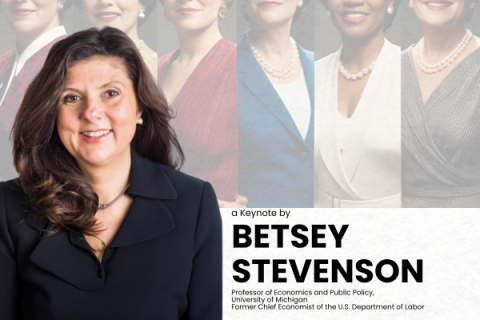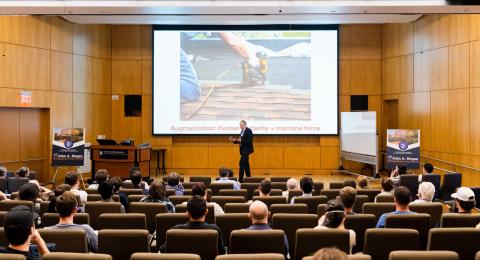Dr. John A. Hogan was a UNH professor of economics and business from 1947 through 1974. He gifted the Department of Economics a fund to be used to establish a professorship and annual lecture in his name to help promote awareness and understanding of contemporary issues relevant to the welfare and productivity of the American workplace. The John A. Hogan speaker series invites a distinguished individual from academia, public policy, government, organized labor or business to speak on important U.S. labor market trends and relevant policy issues.
2026 John A. Hogan Distinguished Lecture
Hilary Hoynes: Investing in Children, Transforming the Future

Thur. April 23, 2026 at 4 p.m. PCBE G75
How do the economic choices we make today shape the lives of children tomorrow? The 2026 John A. Hogan Distinguished Lecturer in Economics, Dr. Hilary Hoynes, will tackle this urgent and profoundly human question during her upcoming presentation at UNH’s Peter T. Paul College of Business and Economics on April 23, 2026.
In her talk, Dr. Hoynes will delve into a growing body of evidence that invites Americans to reconsider their views on programs such as food stamps, the Earned Income Tax Credit, and Medicaid. Her research shows that children with early access to social safety net programs tend to experience better health, stronger educational outcomes, higher earnings, and a reduced likelihood of involvement with the criminal justice system in adulthood. Taken together, these findings suggest that such programs should be understood not as short-term aid, but as long-term investments with measurable societal returns.
Dr. Hoynes is among the most influential voices in economic policy today. She is the Chancellor’s Professor of Economics and Public Policy at the University of California, Berkeley, and is recognized globally for her groundbreaking work on poverty, inequality, and the social safety net. A member of both the National Academy of Sciences and the American Academy of Arts and Sciences, she directs Berkeley’s Opportunity Lab and co-directs the Stone Center on Wealth and Income Inequality, leading research collaborations that advance economic mobility and family well-being. She has also served as Co-Editor of the American Economic Review, Vice President of the American Economic Association, and as a board member for organizations including MDRC and the California Budget & Policy Center.
We invite the campus community and the public to join us on April 23 at 4 p.m. for Dr. Hoynes’ presentation, with a cocktail reception to follow.
Past honorees of the John A. Hogan Distinguished Lecture
2025

Women’s Evolving Role in the Labor Market: Families, Work, and Gender Equity in the 21st Century
Economics is personal for the 2025 John A. Hogan Distinguished Lecturer in Economics, Betsey Stevenson. Stevenson is a preeminent U.S. labor economist who aims to bring economics into the homes of everyday Americans. Her goal is to not only make economics personal and relevant to the individual but to inspire them to use economics to make important decisions in their lives.

“When women enter the workforce in greater numbers, the entire economy benefits,” Stevenson is quoted as saying. Her research explores the evolving role of women in the labor force and the broader economic and policy implications of gender dynamics in the workplace. As a Professor of Public Policy and Economics at the University of Michigan’s Gerald R. Ford School of Public Policy, her work examines how changes in labor market policies, family structures, and workplace norms have shaped economic opportunities for women. Her influential research has provided critical insights into the gender wage gap, labor market participation, and the economic benefits of diversity and inclusion. In addition to her academic contributions, Stevenson has played a pivotal role in shaping national labor policy, serving as Chief Economist at the U.S. Department of Labor and as a member of the White House Council of Economic Advisers under the Obama administration.
“Family-friendly policies are not just about fairness—they’re about economic productivity,” Stevenson states, reinforcing the need for policies that enable women to participate fully in the labor market. She is a recognized authority on the intersection of gender and economics. Stevenson’s work extends beyond academia into public discourse, where she frequently contributes expert analysis to major media outlets and policy discussions. She is a research associate at the National Bureau of Economic Research and has advised policymakers, businesses, and global institutions on strategies to support women’s economic advancement. Through her scholarship and advocacy, Stevenson continues to influence the national conversation on workplace equity, the future of work, and the policies needed to ensure economic opportunities for all.
2024

Impacts of Neighborhood: Why Do Children Turn Out the Way They Do?
What if someone told you that the strength of your social connections and the influence of the people you are surrounded by as a child are the greatest indicators of your “future education, health and economic outcomes”? The 2024 John A. Hogan Distinguished Lecturer, Bruce Sacerdote will explain just that when he speaks at the University of New Hampshire, Peter T. Paul School of Business and Economics on March 28, 2024.
Sacerdote is an American economist and the Richard S. Braddock 1963 Professor of Economics at Dartmouth College. “You study economics to get to the root of the issue,” Sacerdote is quoted as saying in the Dartmouth Alumni Magazine. He is known for his “discipline-blending research” which explores child and youth outcomes and its impact on education, law, and economics. His bio states he "enjoy[s] working with detailed data to enhance our understanding of why children and youth turn out the way they do. [He is] also involved in a series of studies to examine how students make choices about college-going and how policy makers might influence that decision-making process."
He was featured on a 2011 episode of Freakonomics Radio entitled, The Economists Guide to Parenting (Season 1 Ep 39) in which economists discuss the return on investment in child rearing. Here he talks about parental habits as being “contagious” to their children. In effect he and his fellow economists argue that parental impact does not come from how many advantages you give your children but in how you behave around them. The episode argues that the best way to improve your child’s academic, financial and social outcomes is by being a positive role model.
Sacerdote is a 1990 graduate of Dartmouth College and received a Ph.D in Economics from Harvard University. His work has been published in (among other places) American Economic Review, Econometrica, the Quarterly Journal of Economics, American Economic Journal, and the Review of Economics and Statistics. And it has been featured in the New York Times, the Wall Street Journal and National Public Radio.
2023
The Work of the Future: Where Will It Come From
David Autor presents “The Work of the Future: Where Will It Come From” in the 2023 John A. Hogan Distinguished Lecture Series. Autor is a preeminent American Economist and MIT Ford Professor and Margaret MacVicar Faculty Fellow. In 2020, Autor received the Heinz 25th Special Recognition Award from the Heinz Family Foundation for his work “transforming our understanding of how globalization and technological change are impacting jobs and earning prospects for American workers.”
His scholarship explores the labor-market impacts of technological change and globalization on job polarization, skill demands, earnings levels and inequality, and electoral outcomes.
In 2016, Autor presented to TedxCambridge, an independent local TED Talk event. His presentation entitled, “Will Automation Take Away All Our Jobs?” has nearly 2 million views on Ted.com. In a 2019 article, the Economist magazine labeled him as “The academic voice of the American worker.” Later that same year, and with (at least) equal justification, he was christened “Twerpy MIT Economist” by John Oliver of Last Week Tonight in a segment on automation and employment.
